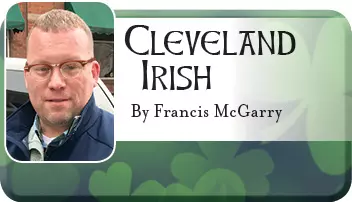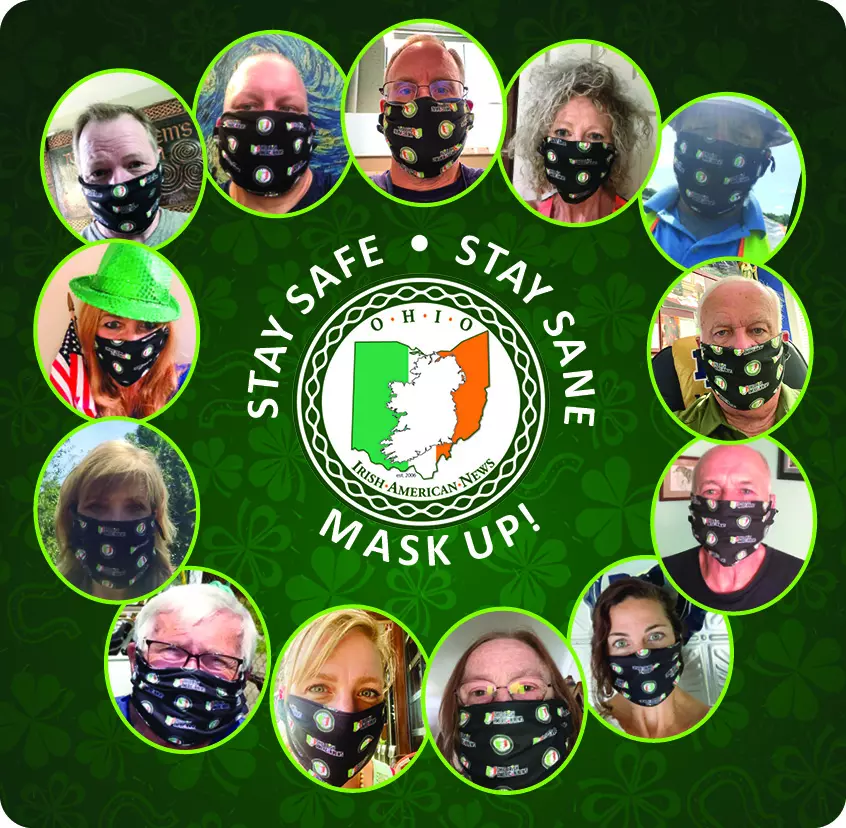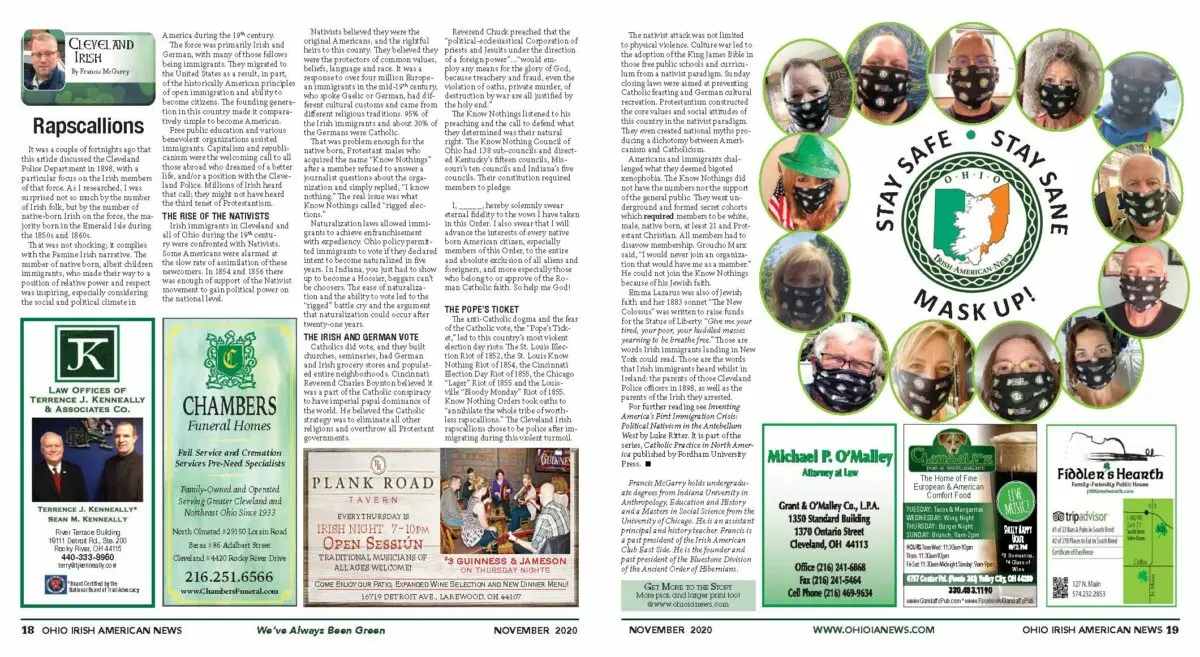
Cleveland Irish: Rapscallions
by Francis McGarry
It was a couple of fortnights ago that this article discussed the Cleveland Police Department in 1898,
with a particular focus on the Irish members of that force. As I researched, I was surprised not so much by the number of Irish folk, but by the number of native-born Irish on the force, the majority born in the Emerald Isle during the 1850s and 1860s.
That was not shocking; it complies with the Famine Irish narrative. The number of native born, albeit children immigrants, who made their way to a position of relative power and respect was inspiring, especially considering the social and political climate in America during the 19th century.
The force was primarily Irish and German, with many of those fellows being immigrants. They migrated to the United States as a result, in part, of the historically American principles of open immigration and ability to become citizens. The founding generation in this country made it comparatively simple to become American.
Free public education and various benevolent organizations assisted immigrants. Capitalism and republicanism were the welcoming call to all those abroad who dreamed of a better life, and/or a position with the Cleveland Police. Millions of Irish heard that call; they might not have heard the third tenet of Protestantism.
The Rise of the Nativists
Irish immigrants in Cleveland and all of Ohio during the 19th century were confronted with Nativists. Some Americans were alarmed at the slow rate of assimilation of these newcomers. In 1854 and 1856 there was enough of support of the Nativist movement to gain political power on the national level.
Nativists believed they were the original Americans, and the rightful heirs to this county. They believed they were the protectors of common values, beliefs, language and race. It was a response to over four million European immigrants in the mid-19th century, who spoke Gaelic or German, had different cultural customs and came from different religious traditions. 95% of the Irish immigrants and about 30% of the Germans were Catholic.
That was problem enough for the native born, Protestant males who acquired the name “Know Nothings” after a member refused to answer a journalist questions about the organization and simply replied, “I know nothing.” The real issue was what Know Nothings called “rigged elections.”
Naturalization laws allowed immigrants to achieve enfranchisement with expediency. Ohio policy permitted immigrants to vote if they declared intent to become naturalized in five years. In Indiana, you just had to show up to become a Hoosier, beggars can’t be choosers. The ease of naturalization and the ability to vote led to the “rigged” battle cry and the argument that naturalization could occur after twenty-one years.
The Irish and German Vote
Catholics did vote, and they built churches, seminaries, had German and Irish grocery stores and populated entire neighborhoods. Cincinnati Reverend Charles Boynton believed it was a part of the Catholic conspiracy to have imperial papal dominance of the world. He believed the Catholic strategy was to eliminate all other religions and overthrow all Protestant governments.
Reverend Chuck preached that the “political-ecclesiastical Corporation of priests and Jesuits under the direction of a foreign power”…“would employ any means for the glory of God, because treachery and fraud, even the violation of oaths, private murder, of destruction by war are all justified by the holy end.”
The Know Nothings listened to his preaching and the call to defend what they determined was their natural right. The Know Nothing Council of Ohio had 138 sub-councils and directed Kentucky’s fifteen councils, Missouri’s ten councils and Indiana’s five councils. Their constitution required members to pledge:
I, _____, hereby solemnly swear eternal fidelity to the vows I have taken in this Order. I also swear that I will advance the interests of every native born American citizen, especially members of this Order, to the entire and absolute exclusion of all aliens and foreigners, and more especially those who belong to or approve of the Roman Catholic faith. So help me God!
The Pope’s Ticket
The anti-Catholic dogma and the fear of the Catholic vote, the “Pope’s Ticket,” led to this country’s most violent election day riots: The St. Louis Election Riot of 1852, the St. Louis Know Nothing Riot of 1854, the Cincinnati Election Day Riot of 1855, the Chicago “Lager” Riot of 1855 and the Louisville “Bloody Monday” Riot of 1855. Know Nothing Orders took oaths to “annihilate the whole tribe of worthless rapscallions.” The Cleveland Irish rapscallions chose to be police after immigrating during this violent turmoil.
The nativist attack was not limited to physical violence. Culture war led to the adoption of the King James Bible in those free public schools and curriculum from a nativist paradigm. Sunday closing laws were aimed at preventing Catholic feasting and German cultural recreation. Protestantism constructed the core values and social attitudes of this country in the nativist paradigm. They even created national myths producing a dichotomy between Americanism and Catholicism.
Americans and immigrants challenged what they deemed bigoted xenophobia. The Know Nothings did not have the numbers nor the support of the general public. They went underground and formed secret cohorts which requiredmembers to be white, male, native born, at least 21 and Protestant Christian. All members had to disavow membership. Groucho Marx said, “I would never join an organization that would have me as a member.” He could not join the Know Nothings because of his Jewish faith.
Emma Lazarus was also of Jewish faith and her 1883 sonnet “The New Colossus” was written to raise funds for the Statue of Liberty. “Give me your tired, your poor, your huddled masses yearning to be breathe free.” Those are words Irish immigrants landing in New York could read. Those are the words that Irish immigrants heard whilst in Ireland: the parents of those Cleveland Police officers in 1898, as well as the parents of the Irish they arrested.
For further reading see Inventing America’s First Immigration Crisis: Political Nativism in the Antebellum West by Luke Ritter. It is part of the series, Catholic Practice in North America published by Fordham University Press.
*Francis McGarry holds undergraduate degrees from Indiana University in Anthropology, Education and History and a Masters in Social Science from the University of Chicago. He is an assistant principal and history teacher. Francis is a past president of the Irish American Club East Side. He is the founder and past president of the Bluestone Division of the Ancient Order of Hibernians.






